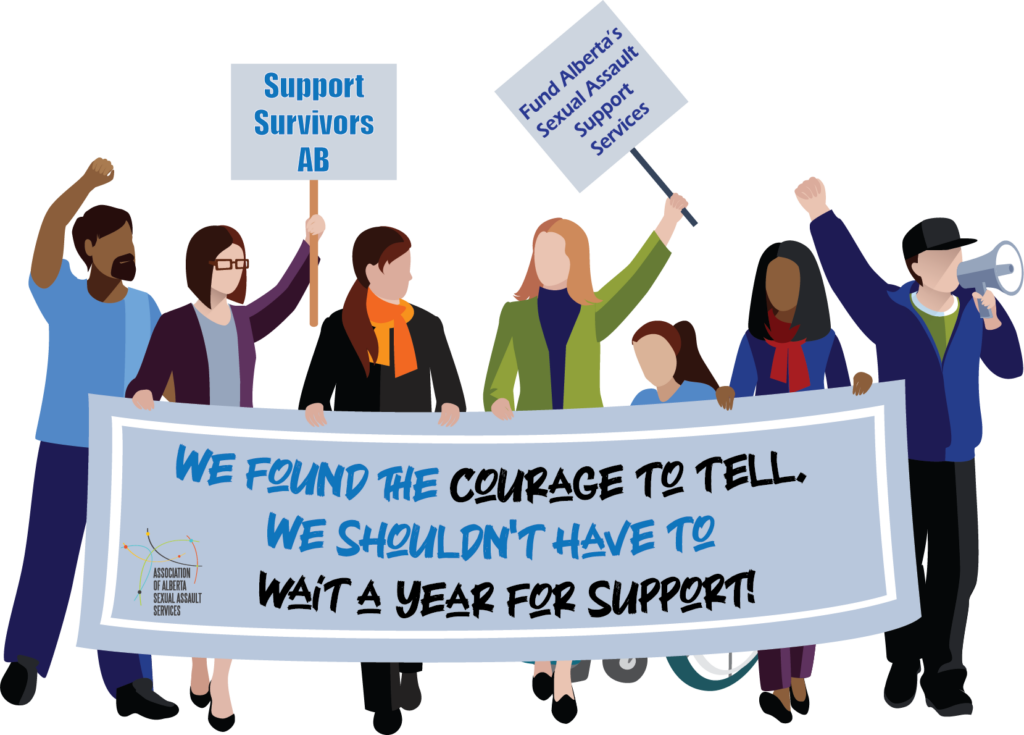Yes! Sexual violence is prevalent in our communities with 43% of Albertans experiencing sexual violence in their lifetimes.
Since 2014, Alberta Sexual Assault Services have seen significant increases both in demand for services and the complex needs of survivors.
Additional resources are vital to meet the needs of Albertans.
“Not all survivors are as lucky as I am, not all of us have the strength to hang on. The reality is that not all of us will make it.”Neil
By adequately and sustainably funding four areas, Sexual Assault Services in Alberta will be able to truly address the needs of survivors and work towards ending sexual violence in our province.
- Enhancing the counselling capacity of the sector;
- Addressing the increasingly complex needs of survivors;
- Helping survivors to access justice, and
- Providing more school- and community-based prevention programs so we can keep our communities safe.
On May 10th, both the NDP and UCP committed to increased funding for sexual assault support services. The fact that sexual violence is being discussed by both parties during this election campaign is a sign that this issue’s importance is being recognized and considered seriously.
Thank you to everyone who has raised this issue with the government and election candidates this year, expressing your support for adequately and sustainably funding sexual assault services in our province.
Let your candidates know that funding specialized sexual assault support services is an important election issue, and that sexual violence is linked to some of our most serious social and health problems – like addictions; chronic and persistent mental illness; homelessness; and unemployment.
Thank your candidate if their party has committed to increased funding to support survivors of sexual violence in Alberta, and let them know you look forward to seeing the impact of their funding should their party be elected.
Vote! It’s important to participate in the electoral process especially when such vital issues, like sexual violence support, are at stake.
AASAS does not endorse any political party and offers no opinion on who to vote for. This information is offered only in the interests of survivors of sexual violence, their families and support people, to encourage Albertans to participate in the electoral process.
Register to vote
Use your address or use your “Where to Vote” card to register
Make a plan to vote and choose your preferred voting option
Bring ID when you go to vote
Learn how Elections Alberta makes voting accessible
To vote, you must be:
- A Canadian citizen
- 18+ years of age, and
- A resident of Alberta
Albertans who have a legal guardian have the right to cast their own vote. Learn more about who can vote.
How to vote:
If you need help marking the ballot you can bring a friend, family member, or support staff with you, or can ask for help from the Elections Alberta staff at the voting location.
Choose from four ways you may want to vote:
- Election Day – May 29 at your assigned voting location
- Advance Voting – May 23-27 at advance voting locations
- At a Returning Office – If you are unable to vote on Election Day or on advance voting days, you may vote at the returning office for your electoral division starting on May 1.
- By Mail – Electors choosing this voting option must apply in advance and declare their reason for voting by Special Ballot. Applications to vote by mail are now being accepted.
“On behalf of all survivors across the province – who are your friends, coworkers and family members – I ask you to contact your provincial election candidates and let them know that Albertans deserve recovery and healing services, they deserve justice, they deserve to be heard and supported. Encourage your candidates to make sexual violence prevention, and the health of Alberta communities a priority by providing adequate and sustainable funding to our sexual assault services.”Deb Tomlinson, CEO of AASAS
